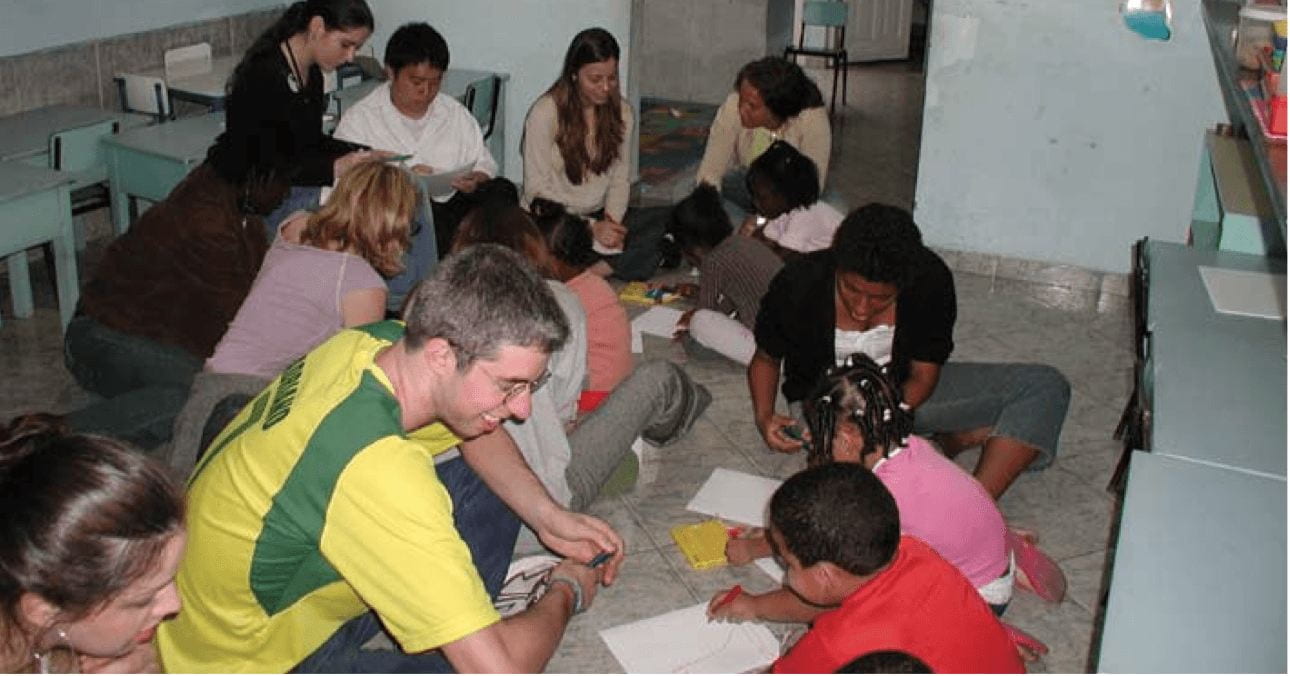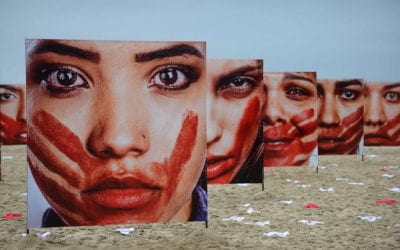Quem vai ao Brasil, se apaixona
A Look at Student Programs

Gabriel Rocha ‘08; Lemann fellow Felipe Fregni (HSPH and HMS) Photo courtesy of Clemence Jouet Pastre
Since the 1994 founding of the David Rockefeller Center for Latin American Studies (DRCLAS), we’ve been able to observe an interesting (yet unsurprising!) phenomenon: the student who travels to Brazil for the first time will always return to Brazil. Like most, Harvard students quickly become enamored of the beautiful and intriguingly complex country. Whether they travel to Brazil for spring break or as a participant of a summer language program, they often make the Brazil Studies Program at DRCLAS their first stop on the way back, to learn how they can return there through study abroad, a summer internship, a research trip for a senior thesis or doctoral dissertation, or to make working or volunteering in Brazil part of their post-graduation plans.
Now, thanks to a generous gift by Jorge Paulo Lemann, more students can travel to Brazil, and more Brazilians can come to Harvard. And we hope they’ll keep returning and traveling back and forth. The establishment of the Jorge Paulo Lemann fellowships provides competitive scholarships to Brazilians enrolling in master’s degree programs at the Kennedy School of Government (KSG), the Graduate School of Education (GSE) and the School of Public Health (HSPH). This academic year, four Brazilians were able to study at Harvard thanks to the Jorge Paulo Lemann fellowships: Felipe Fregni, HSPH; Guilherme Ribeiro, HSPH; Danyela Moron, KSG; and Ana Gabriela Pessoa, GSE. In addition, two doctoral students at the Graduate School of Arts and Sciences are spending the spring 2007 semester conducting dissertation research in Brazil: Patricia Vieira and Bruno Carvalho, both from the Department of Romance Languages and Literatures.
The Jorge Paulo Lemann gift also provides ten Harvard College students with generous funding to travel to Brazil for immersion experiences. One such experience, the DRCLAS Summer Internship Program, will be launched this summer in Brazil’s economic capital and the largest metropolis in the southern hemisphere. Eight students have been selected to spend the summer of 2007 in São Paulo working with local organizations, ranging from non-profit organizations working on advancing human rights, disarmament, economic development and youth participation in policymaking to financial and legal private sector companies. Undergraduates participating in the program will also be living with local host families and benefiting from an initial orientation and constant mentoring from the DRCLAS Brazil Office in São Paulo. In addition, students participating in independent summer internships in the rest of Brazil will also be invited to take part in the first week of the orientation program.
Another immersion opportunity that has attracted a record number of students is summer and semester-length study programs in Brazil. Enthusiasm for these programs places Brazil in the top ten travel destinations at Harvard. Several options spanning the breadth of Brazil exist. For students with only two semesters or the equivalent in Portuguese language training, the Harvard Summer School Program in Rio offers an intermediate level course in Brazilian culture and Portuguese language at the Pontifícia Universidade Católica in Rio de Janeiro in a five-week program led by Clémence Jouët-Pastré, Senior Preceptor in Romance Languages and Literatures (see related story on p. xx). Harvard undergraduates and graduate students can also enroll for semester-length study at leading Brazilian universities including the University of São Paulo (USP), the Fundação Gétulio Vargas in São Paulo and Rio de Janeiro, IBMEC São Paulo and with the in-country presence of the DRCLAS Brazil Office receive advice on selecting suitable programs and courses.
Undergraduates have the opportunity to enroll in courses covering topics such as the sociology of Brazilian race relations, authoritarianism and democracy in contemporary Brazil and the modern Brazilian economy. New opportunities also exist for Harvard Law School students to gain expertise on the Brazilian Civil Code, the rules governing the largest stock exchange in Latin America or intellectual property frameworks protecting compulsory licensing for pharmaceutical drugs. In addition to São Paulo and Rio de Janeiro, Harvard College students are taking courses with Brazilian students as far south as Porto Alegre and as far north as Salvador da Bahia in spring 2007. Plans are also advancing for Harvard School of Public Health to participate in an Infectious Disease Winter Course to be held in the spring 2008 semester in collaboration with the Faculdade de Ciências Médicas da Santa Casa de São Paulo. Taught by Mary Wilson, Associate Professor in the Department of Population and International Health and Felipe Fregni, Instructor in Neurology, Harvard Medical School, the two-week course will allow fifteen Harvard School of Public Health students to gain training in diseases endemic to Brazil: schistosomiasis, leishmaniasis, malaria, cholera, dengue and yellow fever.
Students returning from Brazil keep the country’s allure and energy manifest on campus, by acting as peer advisors, joining the Harvard Capoeira Club, attending the events of DRCLAS, and partaking in the Harvard Brazilian Organization’s annual feijoada. On February 21, the Brazil Studies Program at DRCLAS hosted a lunch with the current Lemann fellows and undergraduate students who had recently returned from spending a semester in Rio de Janeiro. The messages that came out of the lunch were clear: from the Jorge Paulo Lemann fellows: it’s imperative that Brazilians are aware of Harvard’s broad range of programs and ways to overcome perceived financial obstacles to getting to Harvard; from the students who traveled to Brazil, the impulse to return, and to spread the word to their classmates who might not have considered traveling to Brazil because of the distance, the language barrier, or the financial implications of spending a semester or summer in Brazil. Thanks to Jorge Paulo Lemann and the Brazil Studies Program, the road between Harvard Yard and Brazil continues to become shorter and more well-traveled.
Spring 2007, Volume VI, Number 3
Erin Goodman is a Program Officer for the David Rockefeller Center for Latin American Studies in Cambridge.
Lorena Barberia is a Program Associate for the David Rockefeller Center for Latin American Studies’ DRCLAS Brazil Office.
Related Articles
Violence Against Women in Brazil: Public Policy and its Implementation in Rural Areas
English + Português
Eight o’clock in the evening—it’s time to gather and watch the national news program in Rio de Janeiro, Brazil.
2022: Uma Encruzilhada Histórica
English + Português
Este segundo turno da eleição 2022 no Brasil é um embate histórico entre visões de mundo. Entre concepções de vida e seus sistemas de valores. Você vai eleger (etimologia: escolher) em que mundo seria concebível viver.
Editor’s Letter: Brazil
Brazil is different. Brazil is huge. Brazil is colorful. Brazil is magic. In Brazil, the people speak Portuguese instead of Spanish.




